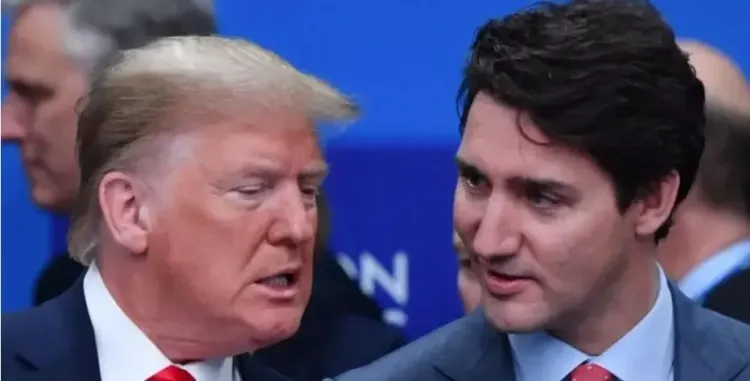Tariff Threats Between US and Canada Ignite Trade War Fears

Ottawa, Dec 13 (NationPress) A prominent representative from the Ontario government, Canada, recently issued a warning that the province could potentially implement a ban on US-made alcohol and restrict electricity exports to several states in the United States if President-elect Donald Trump decides to impose tariffs on all products from Canada, according to reports from various media outlets.
This alert, coupled with similar warnings from Canadian officials, has intensified worries regarding a possible trade war between the United States and one of its key trading allies.
Moreover, a senior official indicated that Ontario, which is Canada’s most populated province, is contemplating the introduction of export bans on vital minerals critical for electric vehicle batteries and may prevent US companies from participating in the province's government procurement processes, as reported by the Xinhua news agency, citing the Associated Press.
On Thursday, Ontario Premier Doug Ford confirmed that the province is evaluating the possibility of cutting energy supplies to the US states of Michigan, New York, and Wisconsin. "We power 1.5 million (US) homes, and if they impose tariffs, it will become unaffordable for Americans to buy electricity," Ford informed reporters.
"If you come and attack Ontario, you attack the livelihoods of people in Ontario and Canadians; we are going to use every tool in our toolbox to defend Ontarians and Canadians," Ford stated.
Responding to Ford's warnings, Trump commented on the same day, "That's OK if he does that. That's fine."
"I have so many friends in Canada, but we shouldn't have to subsidise a country," remarked the US President-elect, who announced in late November his plan to impose a sweeping 25 percent tariffs on all imports from Canada and Mexico.
Earlier this week, Canadian Prime Minister Justin Trudeau convened a meeting with provincial premiers to unify a response to the anticipated tariffs. Finance Minister Chrystia Freeland disclosed that several premiers backed a "robust Canadian response," including the restriction of exports of critical minerals and metals to the United States.
Freeland also mentioned that Canadian business and labor leaders are collaborating with their US counterparts to tackle this issue.
The proposed tariffs on Canada and Mexico would have a considerable effect on US consumers, inflating prices for automobiles, vegetables, fuel, prepared foods, and animal products, according to a report from the Peterson Institute cited by CNN on Thursday.
"American consumers and firms will bear the impact of higher tariffs, leading to substantial costs for the average American household, which will disproportionately affect lower-income households," stated researchers from the Peterson Institute.
In the meantime, a survey conducted by Nanos Research for CTV News earlier this month indicated that around 65 percent of Canadians would be "less likely" or "somewhat less likely" to buy US products if the proposed tariffs were enacted.
A model created by the Canadian Chamber of Commerce estimates that a mere 10 percent tariff could shrink Canada’s GDP by 0.9 to 1 percent, costing about 30 billion Canadian dollars ($21.3 billion) annually, while the United States might incur losses of 125 billion ($88.8 billion) a year. A 25 percent tariff would likely exacerbate these losses, as per a report by Canadian Press in November.









